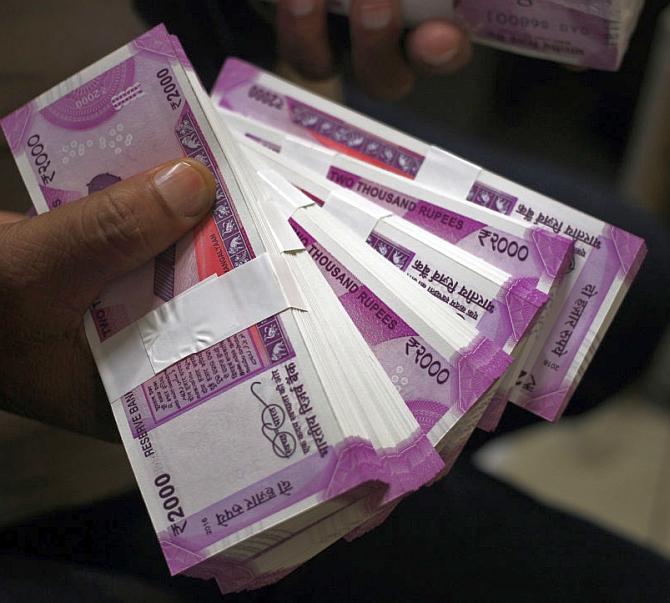'The most fundamental flaw with the electoral bond scheme is that it is designed to make anonymous donations.'
'It makes it easy for black money holders as well as corrupt corporates to donate money to the ruling party and ask for a quid pro quo without anybody getting any idea about it.'

Lawyer and activist Prashant Bhushan, whose NGO Common Cause along with Association for Democratic Reforms, challenged five major amendments to the Finance Act, 2017 and Finance Act 2016, in the Supreme Court, thinks that electoral bonds make funding of political parties by corporates more opaque.
While advocates of transparency in political funding like Bhushan challenged it in the Supreme Court, India's election regulator, the Election Commission too stated last year that electoral bonds do not solve transparency in political funding.
After Union Finance Minister Arun Jaitley rolled out the new rules for electoral bonds last year, Prashant Bhushan told Prasanna D Zore that the scheme "will open the doors for systemic quid pro quo."
How effective and transparent are the rules that govern the electoral bond scheme?
These rules are bogus.
There is no transparency about revealing the names of donors or buyers of these electoral bonds.
Only the government of the day will know who the donors are and who have donated how much to which political party given that these bonds could be bought only from specified branches of the State Bank of India.
What are the flaws in these rules?
The public at large will have no clue about the donors as well as the nature of money used to purchase these bonds.
In any case, it (rules as notified by the finance ministry) now opens the door not just for routing black money through various benami (unknown) people and shell companies, you also can get electoral bonds purchased and give them back to political parties and nobody will have any idea about it.
Secondly, it opens the door for systemic quid pro quo.
Let's say a company gives a bond worth Rs 1,000 crore to the BJP (Bharatiya Janata Party). And then since the BJP knows who has given them this bond, it gives the company a contract.
So, who will come to know about this?
Or a corporate tells the ruling party that it will donate Rs 1,000 crore in electoral bonds to them only if it gets favourable terms for a particular contract.
So, a corporate gives the government of the day a bond worth thousands of crores and the government returns the favour by granting this corporate a meaty contract.
Any government in power can take kickbacks through electoral bonds and nobody will be wiser about it.
So, now this donation route will be used to route kickbacks for favours.
The most fundamental flaw with the electoral bond scheme is that it is designed to make anonymous donations.
Of course, black money was donated even earlier by way of cash, which was shown by political parties as petty cash.
Will this scheme encourage corporates to buy these electoral bonds and give it only to the ruling political party?
These corporates will rest assured that other political parties will never know who they donated the money to.
But the government can come to know if corporates donate these electoral bonds to their opponents or Opposition parties because the government have control over the bank which issues and deposits these bonds.
The finance minister, while announcing the highlights of the electoral bond scheme, said it will 'cleanse the system'.
Given the flaws you have pointed out, how hollow or hopeful does this claim sound to you?
Completely hollow.
Because, the reforms which were required were to do away with cash donations altogether and make political parties totally cashless.
The prime minister keeps asking people who don't have bank accounts to go cashless, but political parties are not being made to go cashless.
Instead of doing that, they (the BJP-led National Democratic Alliance government) have made three very retrograde changes.
One among which is funding of political parties through electoral bonds.
The second is removing the limit of corporate donations from seven-and-a-half per cent of profits to unlimited donations.
Thirdly, they have effectively allowed foreign donations by an amendment to the FCRA (Foreign Contribution Regulation Act) laws.
With these three amendments the government has done away with whatever little transparency and accountability that existed.
Instead of bringing in more transparency by removing cash donations they have done away with whatever transparency was there.
Money that is now given through banking channels (through these electoral bonds) will remain anonymous.
What is the reason that even the Opposition is mum about these rules?
The main Opposition today, which is the Congress, will also benefit because of these rules whenever it comes to power.
Given that there are chances the government will know which corporate is donating to whom, won't there be chances of a government witch hunt against those who donates to the Opposition parties?
So far as the government is concerned it can (launch a witch hunt).
What makes a government to push such a scheme with such glaring fundamental flaws? Is the government of the day encouraging corruption through such schemes?
Of course. There is no doubt about it.
Given the demerits of this scheme, how would you look at its success or failure?
It will be very successful in achieving the objectives of the government, which is to allow corruption and make it easy for black money holders as well as corrupt corporates to donate money to the ruling party and ask for a quid pro quo without anybody getting any idea about it.
Corrupt corporates and the ruling party will be the biggest beneficiaries of this scheme.









